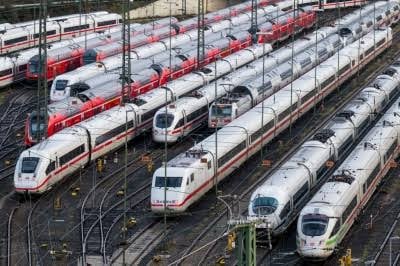Train Strike Threatens German Economy

As German train drivers commenced their longest strike on Wednesday, the economic implications are becoming increasingly concerning. The strike, which is expected to last for six days, is causing significant disruption to both passenger and freight transport, potentially costing the German economy up to €1 billion.
This figure includes the daily cost to the economy, estimated at €100 million, and additional impacts from disrupted supply chains. German Transport Minister Volker Wissing criticized the strike for its destructive effects, especially given the current challenges in supply chains due to Yemen's Huthi rebels attacking shipping routes in the Red Sea.
The strike, organized by the GDL union, affects not just long-distance trains but also regional services. This industrial action is the fourth since November and follows a similar walkout earlier in January. The disruption is forcing passengers to alter their travel plans and is placing additional strain on an already ailing German economy.
What Does This Mean for Me?
Deutsche Bahn estimated that each day of the strike incurs costs tens of millions of euros. However, the overall economic impact is expected to be much larger.
The GDL union is demanding higher salaries to offset inflation and a reduction in working hours without wage loss, aiming to make train driver jobs more appealing to young people.
In contrast, Deutsche Bahn has offered pay increases of up to 13%, an inflation bonus, and a reduced working week from 2026. Despite this, negotiations remain stalled, with Wissing criticizing the union for not negotiating in good faith.
More News
.webp)
Canada Shields Steel and Lumber Industries From Tariffs
4 hours ago

Trump Drops Selected Tariffs in Response to Inflation Pressures
2 days ago

Tariffs on Mexico Test Nuevo Leon’s Industrial Momentum
6 days ago

US Moves to Ease Latin American Tariffs as Food Inflation Mounts
1 week ago

Japan Faces First GDP Shrinkage in Six Quarters as Tariffs Bite
1 week ago

India’s Inflation Dip Strengthens Case for RBI Easing
2 weeks ago

Europe Rallies as Shutdown Eases, Earnings Impress
2 weeks ago

Germany’s Trade Surplus Slides as Imports Outpace Exports
2 weeks ago